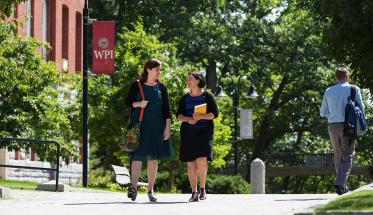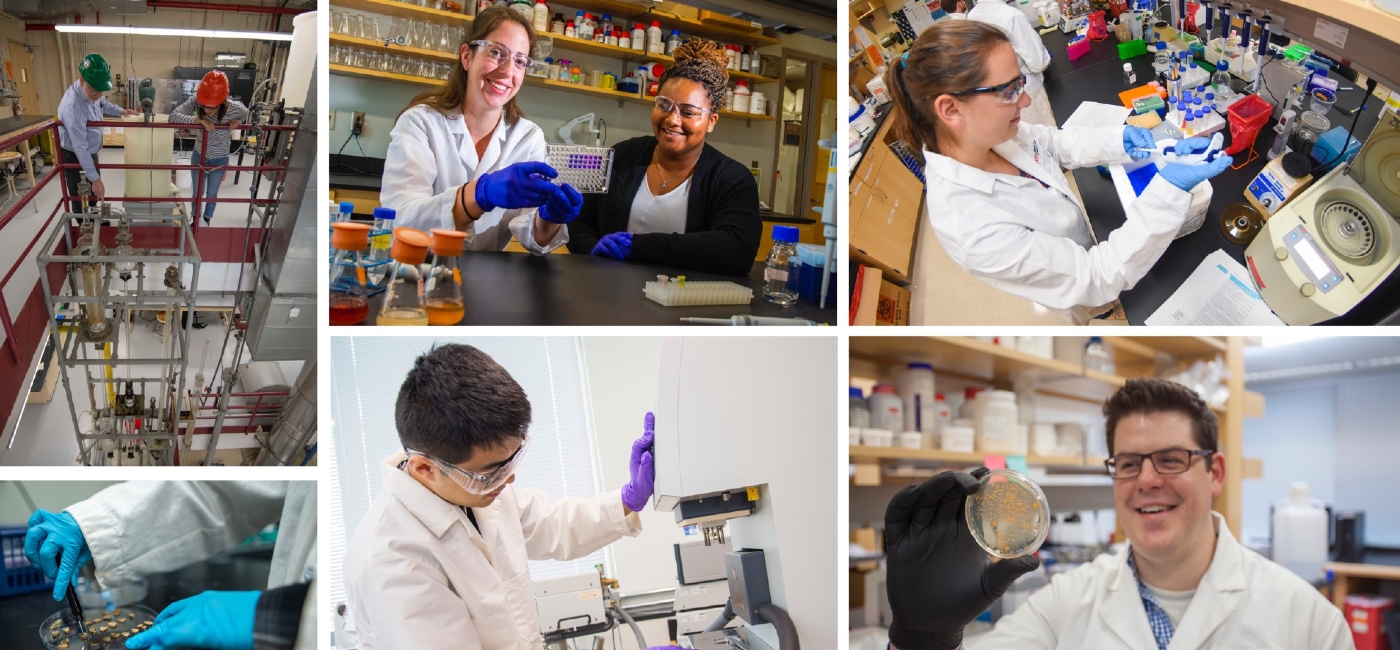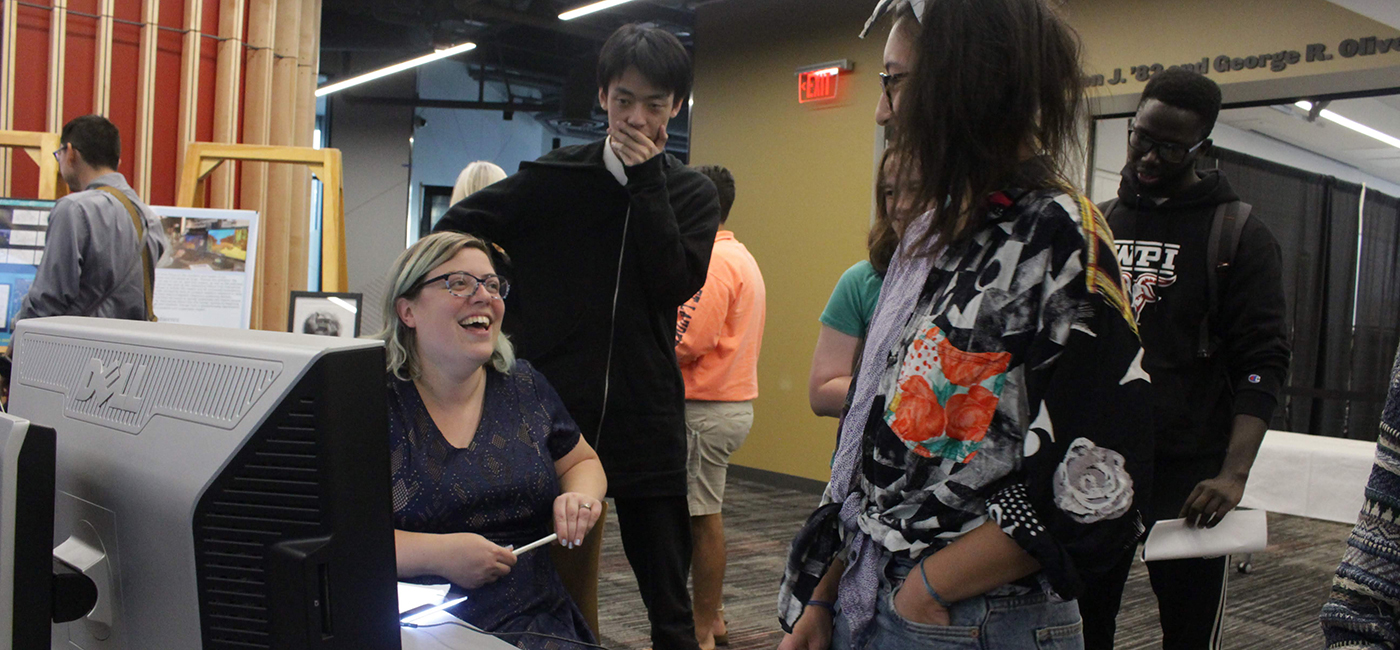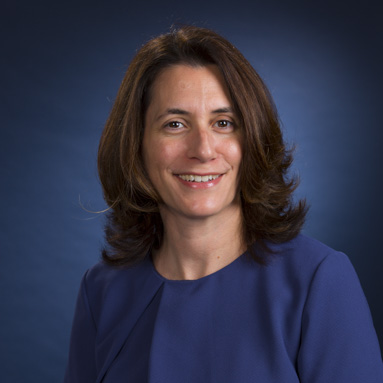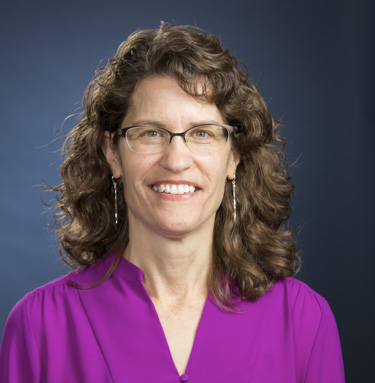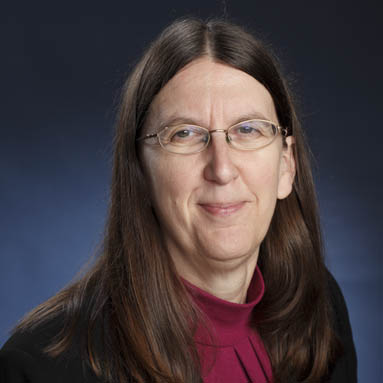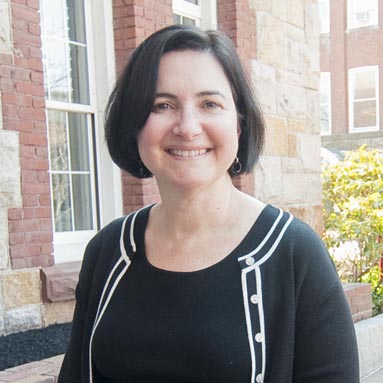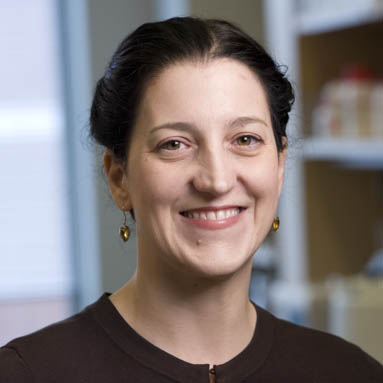Among WPI’s most potent tools for achieving those aims, the task force found, is the mentoring of younger female faculty members by female colleagues who’ve already navigated the path to success in academics, research, and service.
Common Ground
Jennifer Rudolph and Jennifer deWinter say it’s difficult to pinpoint when their relationship evolved from mentorship to close friendship. “My family goes to her family’s house for Thanksgiving every year, now,” deWinter says.
DeWinter, PhD, assistant professor of writing and rhetoric and an associated faculty member in WPI’s Interactive Media and Game Development Program, joined the Department of Humanities and Arts in 2009 and was paired with Rudolph, PhD, associate professor of Asian history and associate department head. While their areas of specialization were different, the two related to one another on their shared interest in Asia (DeWinter had done work in Japan and Rudolph had conducted research in China). They also connected as friends. “She’s personable. I think that gets undervalued in matching up mentors,” says deWinter. “We had a good time.”
They began talking on the phone several times a week. “We would always be brainstorming back and forth ways to address issues, ways to present material to the department or to the faculty,” says deWinter. “When I had to put together my tenure materials, she came down and helped me photo- copy and collect everything and organize it into binders.” Rudolph adds that she has, in turn, learned a great deal from deWinter, and the two have collaborated on grants and projects, spoken on panels, and presented at conferences as a team. As a historian, Rudolph says that she’s accustomed to working solo on projects, but she’s learned new work styles and ways of collaborating from deWinter, who is in a more collaborative field. “The result is almost always much richer than if we’re doing it individually,” says Rudolph.
As women professors in the humanities and arts at a school where STEM studies and men are in the majority, they’ve also shared a challenge. “Together, I think we’ve been able to pull together lots of work and create initiatives that integrate humanities and arts more completely into the WPI core,” Rudolph says. “You can feel sidelined easily in humanities and arts at a STEM school. But you don’t have to be.”
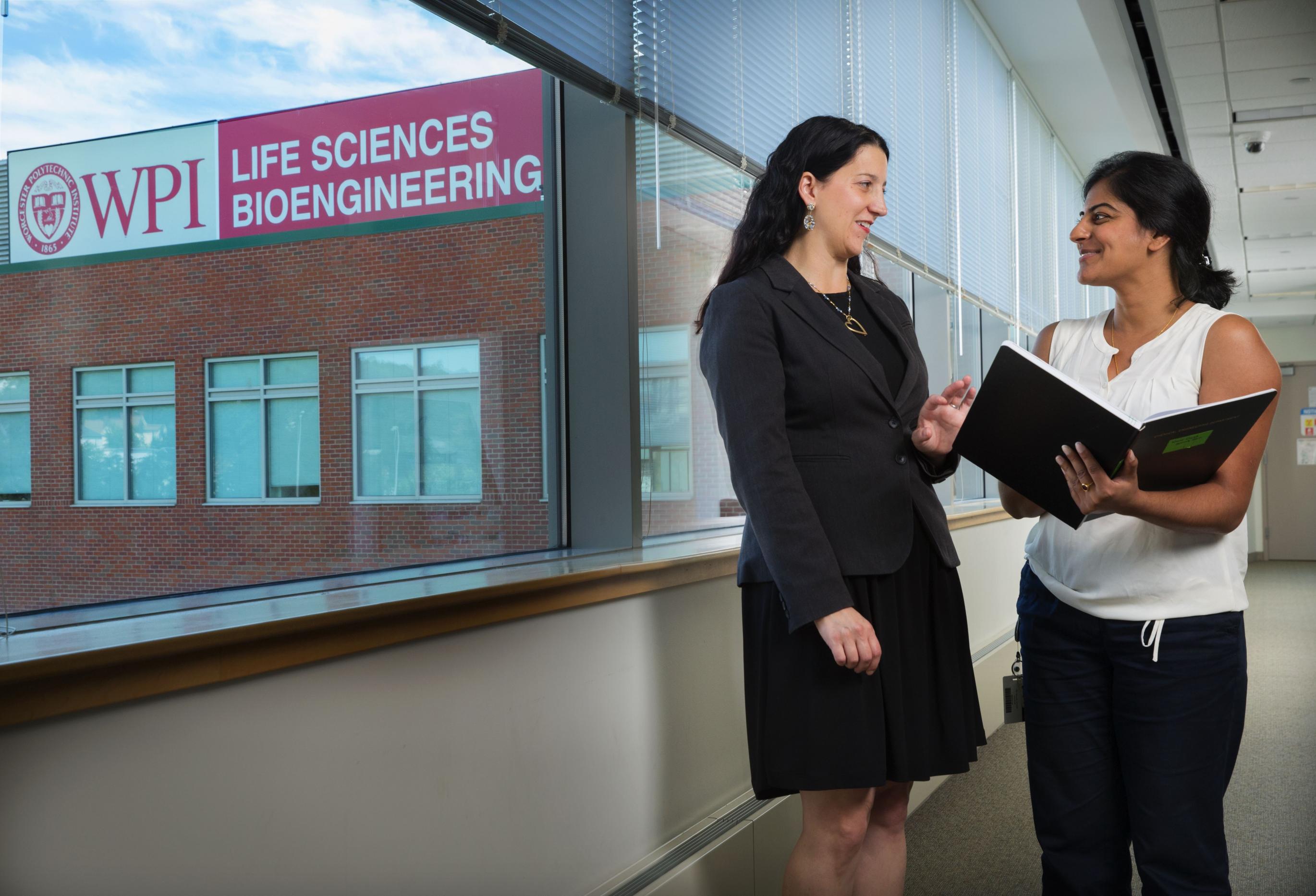 Terri Camesano, left, recalling how she benefitted from having a mentor
Terri Camesano, left, recalling how she benefitted from having a mentor
during her early years at WPI, has worked hard to share what she has learned
with Anjana Jain, who joined the faculty in 2011.
The value of mentoring for female faculty was reinforced by the findings of a recent in-depth survey of the WPI faculty by the Collaborative on Academic Careers in Higher Education (COACHE), which is based at the Harvard Graduate School of Education. The COACHE survey was undertaken in 2013 at the recommendation of the Task Force. The results showed that women faculty at WPI feel supported, that the majority (more than 90 percent) said they’ve received mentoring from within their departments, and that when faculty members were asked to list the best aspects of WPI, women placed “support of colleagues” among their top two.
“For women faculty members, particularly in the STEM disciplines,” Tichenor says, “mentoring is critical. Considering how underrepresented women are within these academic disciplines, especially within leadership roles, getting advice from a veteran colleague of the same gender can make all the difference.”
Engineering a Path
When Terri Camesano, PhD, thinks back to 2000, the year she arrived at WPI, she recalls how helpful it was to have the school match her with a mentor. A professor of chemical engineering who was recently appointed dean of graduate studies, Camesano has worked hard to pass those same lessons on to her own mentee, Anjana Jain, PhD, an assistant professor of biomedical engineering who joined the faculty in 2011.
Jain, who was given a choice of three mentors, said she selected Camesano because she had a strong reputation in teaching and research, and because she was outside of Jain’s department. “Everyone in my department is great,” she says. “They tell me, ‘You know we can mentor you, come and ask us questions any time you want.’ But it has been really nice having a different perspective, from someone I normally would not hear from.”
She says that from the start Camesano was incredibly helpful. She taught her about WPI’s culture, introduced her to colleagues, and shared tips on applying for grants. Most important, she served as a role model. “There are not a lot of women in engineering who’ve decided to go into academia,” Jain says, “so it was really important for me to get to know someone who’s done that and also had success balancing her personal and professional lives.”
Although their formal year as mentor and mentee is over, Camesano and Jain still talk regularly. Today, Camesano is the one with most of the questions. “When I was named dean of graduate studies, it became really important for me to keep up with the needs of the junior faculty coming in,” she says. “Anjana is there for me when I need advice.”
Because of the proven value of mentoring, all new faculty members at WPI are offered the chance to be paired with a mentor through the New Faculty Mentoring Program, based in the Morgan Teaching and Learning Center. During the 2013–14 academic year, 80 percent of WPI’s newly hired tenure track assistant professors participated. Since the program’s inception in 1997, 76 percent of new female tenure-track assistant professors have signed up, versus 66 percent for male tenure-track assistant professors.
Chrysanthe Demetry ’88, PhD, associate professor of mechanical engineering and director of the Morgan Teaching and Learning Center, coordinates the mentoring program. She says she seeks to match faculty members according to their goals, whether that’s grant writing, navigating the tenure and promotion process, balancing teaching and research, or all of the above.
The feedback she gets on the program is positive. “Fairly regularly, I hear that it lessens anxiety for new faculty members, builds their confidence, helps them maintain a positive outlook, and helps build connections and com- munity, especially across departments,” she says.
Lasting Impact
Diane Strong, a professor in the Foisie School of Business and director of the Management Information Systems Program, knows how important it is to make the school a welcoming place for new faculty. Strong has been at WPI since 1995. “When I hire someone, I know this is a person I could potentially work with for the next 20 years,” she says. “Of course I’m going to try to make sure they’re successful.”
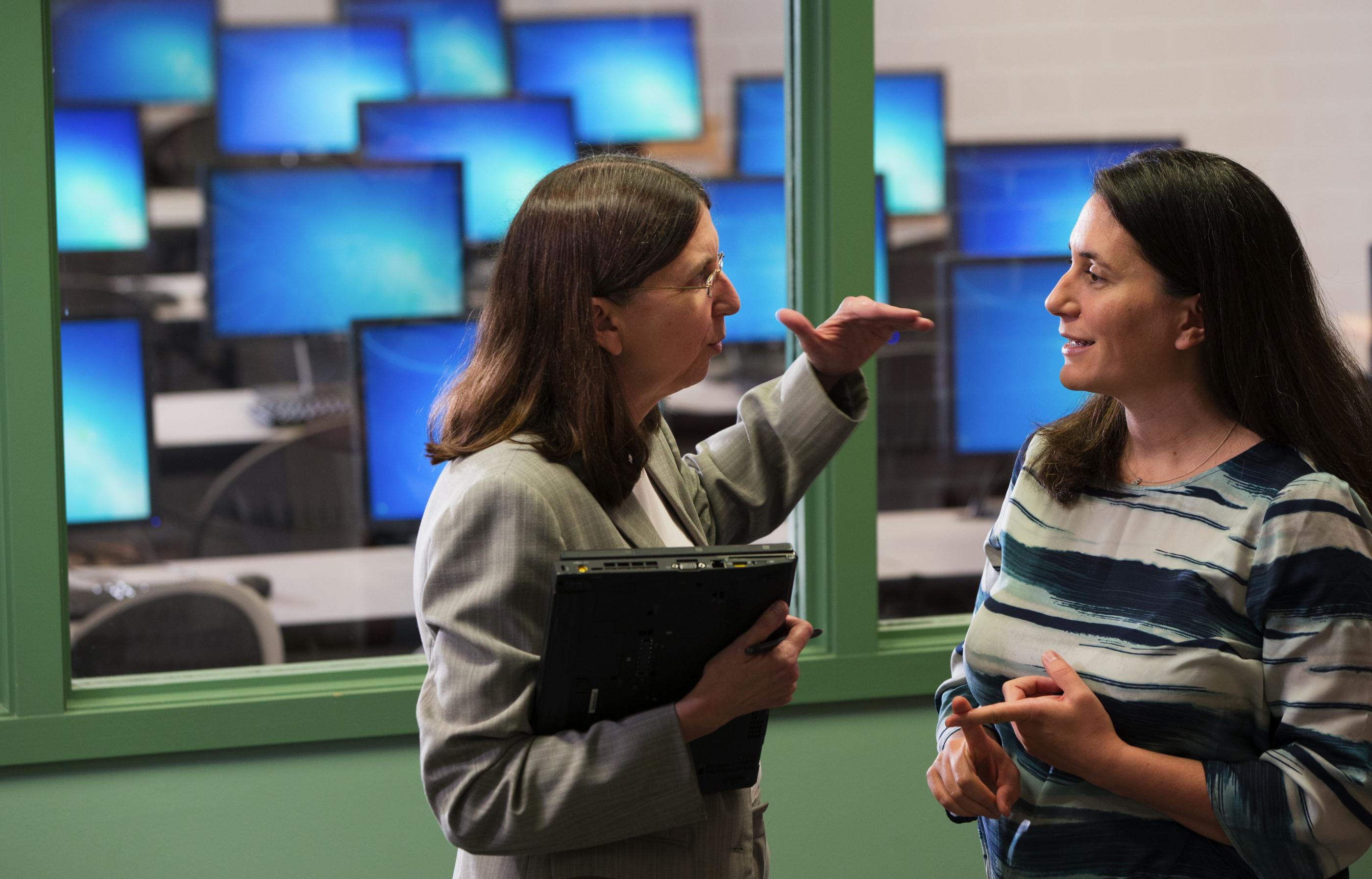
Diane Strong, left, and Bengisu Tulu are colleagues in the Foisie School of
Business. Strong, who served as Tulu’s mentor when she joined the faculty
in 2006, says mentorship can be mutually beneficial. She gained from Tulu’s
up-to-date knowledge of healthcare and information technology while Tulu
participated in grants led by Strong, which helped jump-start her own research
program.
She does that, in part, by serving as a mentor for women like Bengisu Tulu, PhD, assistant professor of information technology in the School of Business. Strong served on the search committee that hired Tulu in 2006. Both women work in the same field and have overlapping research interests in healthcare and information technologies. It proved to be a mutually beneficial relationship, as Tulu, having just received her PhD, was up to date on the latest research in healthcare, while Strong had more than a decade of experience at WPI to share. “This is where mentoring works really well,” says Strong.
Tulu says that Strong answered her day-to-day questions about the university and provided valuable advice on striving for a work/life balance. They also complemented one another when it came to research and applying for grants.
“Early on, she put me on certain grants because I had expertise in that area,” Tulu says. “Diane, as a principal investigator with a long track record of obtaining and leading grants, brought credibility to the applications, while my background boosted the team’s expertise. So it helped both of us.” That experience, says Tulu, helped her build her resume enough to get her own grants. “That was a tremendous help,” she says.
Today, nearly 10 years after meeting, the two women still work together and talk daily, although the mentor/ mentee dynamic has faded. “It’s equalized,” says Strong. “Even though she’s more junior, there are things she knows that I don’t know. Today, we work together as colleagues.”
Karen Oates says that as a scientist and a dean at a technically focused university she is acutely aware of the challenges women faculty members in science and engineering face as they seek to rise through the ranks to positions of leadership in academia. In collaboration with the deans of science at Clarkson University and Michigan Technological University, she has applied for a grant through the National Science Foundation’s ADVANCE program, which funds innovations aimed at increasing the participation and advancement of women in academic science and engineering careers. Oates notes that a group of women faculty members has established a WPI chapter of AWIS (the Association for Women in Science), which, as part of its mission, advocates for the needs of women scientists and engineers.
All of these efforts are aimed, over the long term, at building lasting relationships that help retain and advance talented women faculty members, benefitting them, the mentors who help them, and the university. And when it all comes together, the results can be remarkable.
-- By Kate Silver
First published in WPI Research, Spring 2015 edition
